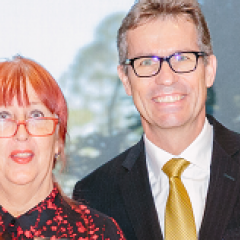
The more than 500,000 Australians with intellectual disabilities can feel invisible to the health care system, according to the Director of UQ`s Queensland Centre for Intellectual and Developmental Disability (QCIDD).
But this is about to change thanks to a University of Queensland project that is removing the barriers to health care for people with intellectual disabilities (ID).
QCIDD Director Associate Professor Nick Lennox is leading the Health Intervention Package. He said a pilot study of the project in Brisbane had reported noticeable improvements in health care for those Australians with ID.
“It showed significant improvements in health screening and health promotion, improved health advocacy and was acceptable to those with ID, their families and general practitioners (GPs),” Dr Lennox said.
Initially supported by the State Government, the UQ project was awarded $779,500 by the National Health and Medical Research Council this month. The project is divided into two parts: a Comprehensive Health Assessment Program (CHAP); and the introduction of a health advocacy tool called the Ask Diary in which adolescents with ID and their parents record the interactions with their GPs.
The CHAP program, a GP-based health review process, resulted in significant increases in immunisations, a six-fold increase in the detection of vision impairment and a massive 30-fold increase in hearing testing.
The Ask Diary also resulted in improved health outcomes in areas including relationships with GPs and increased health screening. Dr Lennox found that 61percent of people with ID, parents and paid carers who used the diary reported being better advocates.
The diary is also used in the classroom with picture pages for communicating symptoms and others for recording health problems.
Studies show there are many unrecognised health problems in adolescents with ID. Vision and hearing defects are the most prevalent, with obesity, orthopaedic problems, incomplete immunisations and skin conditions also very common.
Dr Lennox said people with ID were too often left behind in the progress that had been made in improving the health of Australians.
“Adolescents with ID face enormous difficulties in obtaining even the most basic health care,” he said.
“There are few avenues for them to become empowered and to improve and protect their own health.
“There are also too few health professionals who have received adequate training in this area, and the health care system offers few incentives to ensure appropriate care for people with special needs.
“Because of these factors, individuals with ID suffer health disparities, which must be addressed.”
The UQ project is designed to achieve health gains through intervention, which at its core empowers adolescents with ID, and their families, as they move towards the increased autonomy of adulthood.
“It is focused at a time when they are moving away from the relative protection of special education schools and targeted paediatric health services to limited and possibly inadequately trained generic health-care providers,” Dr Lennox said.
“There are many barriers to health care including poor communication and recall for health information, devaluing and negative attitudes, inadequate training of health and disability staff, as well as the limited government funding to provide support for this population in the community,” Dr Lennox said.
QCIDD is part of UQ`s School of Population Health and is jointly funded by the Department of Disability Services Queensland and Queensland Health.
Research into the Health Intervention Package is continuing at the Mater Hospital in Brisbane.
Media: For more information, contact Associate Professor Nick Lennox (telephone 07 3840 2413 or 0411 204 788) or Chris Saxby at UQ Communications (telephone 07 3365 2479, email


